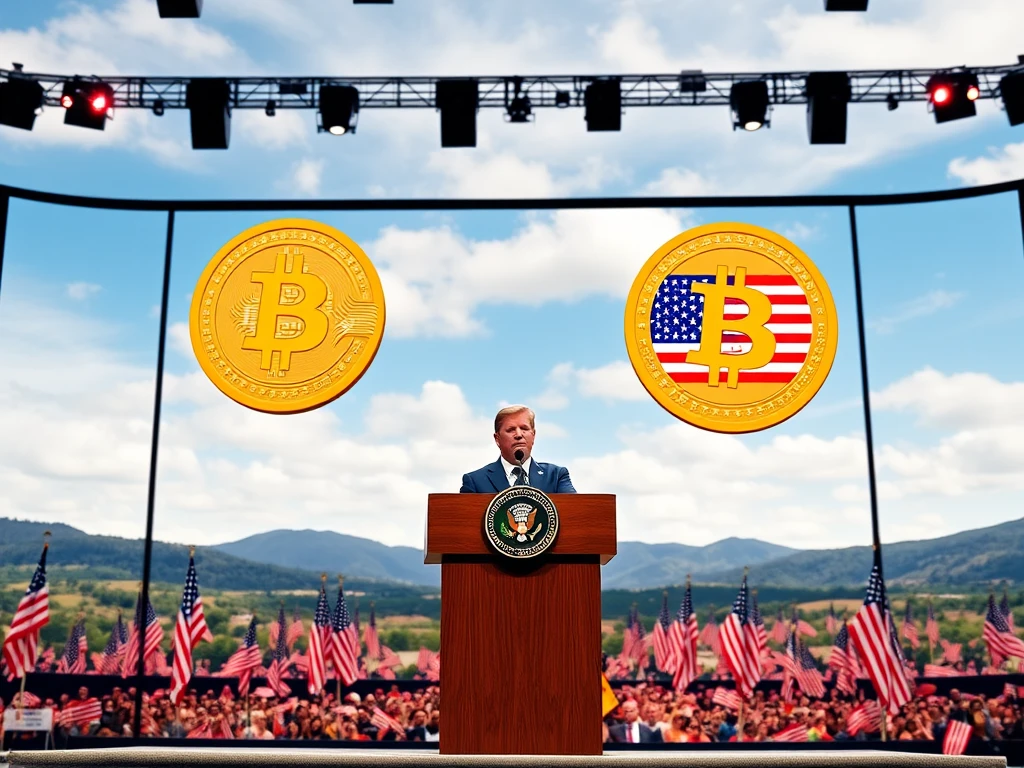Bitcoin: Urgent Call for Crypto Community to Embrace Politics

Imagine a world where the technology you believe in is shaped not just by innovation, but by legislative decisions made in distant halls of power. This was the core message delivered by US Vice President JD Vance at the recent Bitcoin 2025 conference in Las Vegas. Addressing a packed audience, Vance made a compelling plea for the Bitcoin community to step up its involvement in the political arena.
JD Vance’s Key Message: Don’t Ignore Politics
Speaking at the high-profile event, Vice President Vance didn’t mince words. He emphasized that the transformative potential of technologies like Bitcoin is vulnerable to political and bureaucratic decisions if the community remains disengaged. His central call to action was clear: carry the momentum of political involvement forward.
“What happens in the world of politics, what happens in the world of bureaucracy, will affect even the most transformational and valuable technologies if we do not make the right decisions. The first thing that I would ask you, is to take the momentum of your political involvement in 2024 and carry it forward to 2026 and beyond.”
“Don’t ignore politics because I guarantee you, my friends, politics is not going to ignore this community, not now, and not in the future.”
This powerful statement underscores a critical reality: the future of Bitcoin and the broader crypto space is increasingly intertwined with government policy and political will.
The Growing Intersection of Bitcoin and Politics
Bitcoin is no longer just a niche digital asset; it has evolved into an asset class with significant macroeconomic and geopolitical implications. As Bitcoin gains institutional legitimacy, its strategic importance on the global stage is becoming undeniable. Market analysts and proponents alike highlight a quiet but intense race among sovereign powers to understand, acquire, and potentially leverage BTC.
The concept of “nation-state Bitcoin adoption” is gaining traction, driven by a high-stakes game theory. The argument is simple: if competitor nations are accumulating a scarce, globally recognized digital asset, the fear of being left behind (FOMO) compels others to consider doing the same. This dynamic elevates Bitcoin from a purely technological or financial topic to a matter of national strategy and Crypto Politics.
Why US Crypto Regulation Matters
A major theme underlying Vance’s address is the critical need for clear and favorable US Crypto Regulation. He argued that the United States must maintain leadership in the digital finance age. This requires not only fostering innovation but also establishing regulatory frameworks that support, rather than hinder, the growth of the crypto industry, particularly around Bitcoin.
The recent shift in the United States’ stance towards a more pro-crypto approach, exemplified by discussions around creating a Bitcoin strategic reserve or a crypto advisory council, has already sent ripples globally. Other governments are taking note and reconsidering their own policies. For instance, India’s economic affairs secretary, Ajay Seth, acknowledged the borderless nature of digital assets, indicating a potential policy reset influenced by changes in the US.
Key reasons why US regulation is pivotal:
- Sets a global precedent for how major economies handle digital assets.
- Impacts institutional adoption and investment flows.
- Influences where innovation and talent choose to locate.
- Determines the level of consumer protection and market integrity.
Encouraging Broader Crypto Community Involvement
Vance’s speech was a direct appeal to the diverse individuals who make up the Crypto Community. He recognized the passion and technical expertise within this group but stressed that this energy must translate into sustained political engagement. This isn’t just about lobbying; it’s about:
- Educating policymakers on the technology and its potential benefits.
- Participating in political discussions and advocating for favorable policies.
- Supporting candidates who understand and support the crypto space.
- Building bridges between the tech world and the political establishment.
Ignoring the political landscape leaves the community vulnerable to uninformed or hostile regulations that could stifle innovation and limit the potential of Bitcoin and other digital assets.
Global Implications of Bitcoin Adoption
The discussion around Bitcoin Adoption extends beyond individual investors or companies; it’s now a conversation happening at the nation-state level. The possibility of countries strategically acquiring Bitcoin as a reserve asset or integrating it into their financial systems is a significant development. This trend is partly fueled by the perceived advantages of Bitcoin:
- Decentralization and independence from single points of control.
- Scarcity (limited supply of 21 million coins).
- Global accessibility and liquidity.
- Potential hedge against inflation or currency devaluation.
As more nations explore or adopt Bitcoin, the geopolitical landscape could subtly but significantly shift. The US maintaining leadership in this space, as advocated by Vance, is seen by many as crucial for its future economic and strategic standing.
Conclusion: The Time for Political Action is Now
Vice President JD Vance’s address at Bitcoin 2025 served as a powerful wake-up call. The message is clear: the future trajectory of Bitcoin and the entire crypto ecosystem is inextricably linked to the political choices made today and tomorrow. The crypto community, with its passion and growing influence, has a critical role to play in shaping these decisions. By embracing political engagement, educating policymakers, and advocating for sound regulation, the community can help ensure that innovation is fostered, potential is realized, and the United States remains a leader in the age of digital finance. Ignoring politics is no longer an option; active participation is essential for the continued growth and success of Bitcoin and the broader digital asset space.








